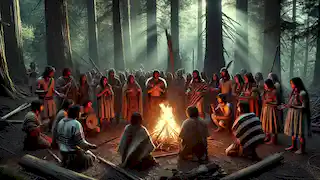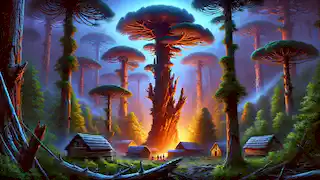Introduction
In the shadowy forests of Southern Chile, where the ancient trees sway with the whispers of the wind, there lies a land rich with stories passed down through generations. The Mapuche people, who have lived in harmony with these lands for centuries, believe that the world around them is inhabited by powerful spirits. These spirits, or *Pillán* and *Ngen*, are protectors, guardians, and sometimes, vengeful forces of nature. The Mapuche live their lives in reverence to these entities, understanding that the balance between the seen and unseen worlds must be maintained. This is the story of how a small village, nestled deep within the heart of the Araucanía region, came to understand the true power of the spirits that dwell within the ancient forests.
The Omen
The village of Leftraru was peaceful, surrounded by towering araucaria trees and the clear waters of the Bío-Bío River. The villagers lived simple lives, fishing, farming, and crafting. However, the tranquility of Leftraru was shattered one cold winter's night when a fierce storm struck the region. The wind howled like a wounded animal, and the rain fell in torrents, flooding the riverbanks. The villagers, huddled in their *rucas* (traditional houses), could only pray to the spirits for protection.
It was during this storm that an ominous sign appeared. The oldest tree in the forest, known as the *Gran Pillán* for its supposed connection to the spirits, was struck by lightning. The tree, which had stood for centuries, was split in two. The elders of the village, wise and attuned to the ways of the spirits, knew this was no ordinary event. They gathered around the remains of the tree the next morning, their faces grim.
"This is a sign," said Lonco Nahuel, the village leader. "The spirits are displeased."
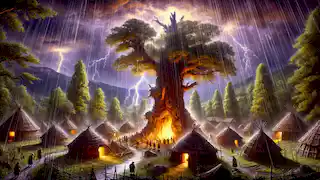
The Curse of the Ngen
Days turned into weeks, and strange occurrences began to plague Leftraru. The once bountiful river no longer provided fish, and the crops started to wither despite the plentiful rains. Even the animals, usually calm and docile, became restless and aggressive. The villagers were afraid, whispering among themselves that the spirits had cursed them for some unknown offense.
Lonco Nahuel consulted the Machi, the village shaman, who was said to have the ability to commune with the spirits. The Machi, an elderly woman with piercing eyes, entered a deep trance, seeking answers from the *Ngen*, the spirits of the land. When she awoke, her face was pale with fear.
"The Ngen are angry," she said in a trembling voice. "They say we have forgotten our duties to them. The balance has been disturbed, and we must make amends."
The villagers were desperate to appease the spirits. The Machi instructed them to offer a great sacrifice to the Ngen. They gathered what little food they had left, along with the finest crafts they could produce, and brought them to the sacred *menoko*, a hidden spring deep in the forest where the Ngen were said to dwell.
But even after the offerings were made, the curse remained. The villagers were at a loss. It seemed as though the spirits would not be satisfied so easily.
The Spirit's Test
One night, as the village lay in restless sleep, a young man named Ruka had a vivid dream. In the dream, he found himself standing before the *Gran Pillán*, but instead of being split in two, the tree was whole again, radiating a soft, otherworldly light. A figure emerged from the tree—tall and majestic, with features that seemed to shift like the wind. Ruka knew immediately that this was a *Pillán*, one of the most powerful spirits.
The Pillán spoke in a voice that echoed like thunder. "The balance has been broken, young one. The people of Leftraru have forgotten the ways of the old. The Ngen are not merely to be appeased with gifts; they must be respected, their presence acknowledged in every aspect of life. You must remind your people of this, or the curse will consume all."
Ruka woke with a start, the Pillán's words still ringing in his ears. He knew what he had to do.
The next morning, Ruka went to Lonco Nahuel and the elders, recounting his dream. Although some were skeptical, the Machi confirmed that dreams were often the way the spirits communicated with mortals. With no other options, the villagers decided to heed Ruka's vision.
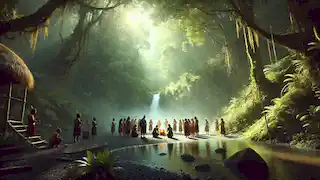
The Journey to Reconciliation
Ruka, along with a group of villagers, set out on a journey to rediscover the old ways. They visited the ancient sites where the spirits were once honored, learning the forgotten rituals and songs that had once been an integral part of their culture. With each new discovery, they felt the presence of the spirits growing stronger, as though the forest itself was awakening.
The Machi guided them in performing the sacred rituals that had long been neglected. They sang the *ül* (sacred songs) and performed the *nguillatun* (ceremonial dance), offering their sincerest apologies and pledging to maintain the balance between the seen and unseen worlds.
As they journeyed deeper into the forest, Ruka began to feel a connection to the land that he had never experienced before. It was as if the spirits were guiding them, showing them the path to redemption.
When they finally returned to Leftraru, they were not the same people who had left. They were now deeply aware of the spirits that inhabited the land, air, and water around them. They immediately set to work, incorporating the old ways into their daily lives, always mindful of the spirits' presence.
The Blessing of the Spirits
The change in the village was almost immediate. The river, which had been barren for so long, suddenly teemed with fish. The crops grew strong and plentiful, and the animals returned to their docile selves. The villagers, once fearful and downtrodden, were now filled with hope and gratitude.
One night, as the village gathered around a great fire to celebrate the return of their prosperity, the sky above them filled with dancing lights—the Aurora Australis, or southern lights. The elders whispered that this was a sign of the spirits' approval, a blessing for the people of Leftraru.
Ruka, standing with the elders, felt a deep sense of peace. He knew that the spirits were watching, and that they had passed the test. From that day forward, the people of Leftraru lived in harmony with the spirits, never forgetting the lessons they had learned.
Conclusion: The Legacy of the Mapuche
The tale of the Mapuche spirits is one that has been passed down through the generations, a reminder of the importance of living in balance with the world around us. The people of Leftraru learned that the spirits of the land are not to be taken lightly, and that respect, gratitude, and mindfulness are essential in maintaining harmony with the unseen forces that govern our lives.
Even today, the Mapuche people honor the spirits in their daily lives, understanding that they are not separate from nature, but a part of it. The story of Leftraru serves as a powerful reminder of the need to respect and protect the natural world, for it is through this respect that we find true peace and prosperity.
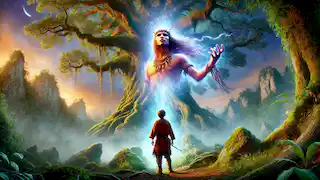
Epilogue: The Spirits' Vigil
Years passed, and the village of Leftraru thrived. The story of their encounter with the spirits became a legend, told to every child as they grew up. The *Gran Pillán*, though still split in two, was now a revered site where the villagers would come to offer thanks and seek guidance.
One evening, as the sun dipped below the horizon, casting a golden glow over the forest, an old man stood before the tree. It was Ruka, now an elder himself, who had led the village through its darkest times. He closed his eyes and offered a silent prayer to the spirits.
As he opened his eyes, he saw a faint figure emerging from the tree, just as in his dream all those years ago. The figure smiled, and Ruka knew that the spirits were still watching, still guarding the balance that he and his people had worked so hard to restore.
And so, the spirits of the Mapuche continued their vigil, protecting the land and its people, as they had done for centuries. The tale of Leftraru became a testament to the enduring power of the spirits and the importance of living in harmony with the world around us.
